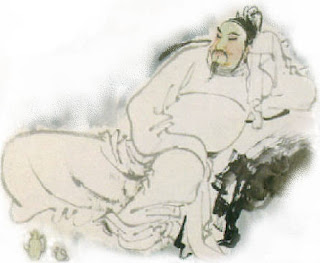Li Bai

Li Bai or Li Po (701-762) was a Chinese poet who lived during the Tang Dynasty.
Called the Poet Immortal, Li Bai is often regarded, along with Du Fu, as one of the two greatest poets in China's literary history. Approximately 1,100 of his poems remain today. The first translations in a Western language were published in 1862 by Marquis D'Hervey de Saint-Denys.
Li Bai is best known for the extravagant imagination and striking Taoist imagery in his poetry, as well as for his great love for liquor. Like Du Fu, he spent much of his life travelling, although in his case it was because his wealth allowed him to, rather than because his poverty forced him. He is said to have drowned in the Yangtze River, having fallen from his boat while drunkenly trying to embrace the reflection of the moon.
Over a thousand poems are attributed to him, but the authenticity of many of these is uncertain. He is best known for his yue fu poems, which are intense and often fantastic. He is often associated with Taoism: there is a strong element of this in his works, both in the sentiments they express and in their spontaneous tone. Nevertheless, his gufeng ("ancient airs") often adopt the perspective of the Confucian moralist, and many of his occasional verses are fairly conventional.
Much like the genius of Mozart there exist many legends on how effortlessly Li Bai composed his poetry; he was said to be able to compose at an astounding speed, without correction. His favorite form is the jueju (five- or seven-character quatrain), of which he composed some 160 pieces. Li Bai's use of language is not as erudite as Du Fu's but impresses equally through his extravagance of imagination and a direct correlation of his free-spirited persona with the reader. Li Bai's interactions with nature, friendship, his love of wine and his acute observations of life inform his best poems. Some, like Changgan xing (translated by Ezra Pound as The River Merchant's Wife: A Letter), record the hardships or emotions of common people. He also wrote a number of very oblique, allusive poems on women.
One of Li Bai's most famous poems is Drinking Alone under the Moon , which is a good example of some of the most famous aspects of his poetry -- a very spontaneous poem, full of natural imagery and anthropomorphism:
Among flowers with a pot of liquor;
I pour alone but with no friend at hand;
So I lift the cup to invite the shining moon;
Along with my shadow, a fellowship of three.
The moon understands not the art of drinking;
The shadow gingerly follows my movements;
Still I make the moon and the shadow my company;
To enjoy the springtime before too late.
The moon lingers while I am singing;
The shadow scatters while I am dancing;
We share the cheers of delight when sober;
We separate our ways after getting drunk;
Forever will we keep this unfettered friendship;
Til we meet again far in the Milky Way.
Source : http://en.wikipedia.org
0 Comments:
Post a Comment
<< Home